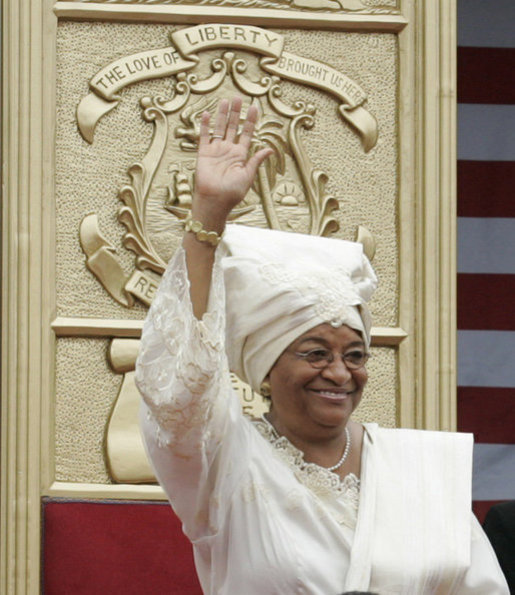Politics has almost always been exclusively left to men, nowhere more so than in Africa. In the midst of tremendous turmoil, stable governments haven’t often been the rule on the continent, but it nonetheless saw a monumental achievement on November 23, 2005: Ellen Johnson Sirleaf became the first woman elected chief executive of an African country, the war-torn Liberia. Born in Monrovia, the nation’s capital, Sirleaf first made the move into public service in the early 1970s. Returning to her homeland from an education abroad in economics and government, including a stop at Harvard’s John F. Kennedy School of Government, she received an appointment as Assistant Minister of Finance under then-president William Tolbert. During a two-year stretch, she gained a reputation for sticking to her principles, often voicing unpopular opinions — something that forced her to resign in 1973. Offered the opening for Minister of Finance in 1979, she rejoined the Tolbert administration, only to see her work cut short by a military coup. Lucky to be alive — much of Tolbert’s cabinet was murdered — Sirleaf fled to the United States before taking a position in the private sector. Working for large financial institutions for the better part of a decade, she eventually landed with the United Nations Development Programme in Africa, where she helped to advance women’s issues on the continent. After an unsuccessful run in 1997, Sirleaf hoped to gain the highest office in Liberia in 2005. Running as part of the Unity Party, she took on George Weah, the popular former soccer player who had spent years helping to bring international attention to the country’s plight during its vicious Second Civil War. Though she came in second during the initial voting, Sirleaf managed to win the head-to-head contest in a disputed election. When the official count was revealed on November 23, 2005, she received the honor of being the first woman chosen to lead a nation anywhere in Africa. Inaugurated in January 2006, Sirleaf has clung to her priority of reducing the national debt through relief programs with foreign lenders as the primary means to help the nation develop economic strength. Within the country’s borders, she has worked to make elementary school available to all the nation’s children. As a testament to her popularity, Sirleaf managed to hold on to her office when elections were held in 2011 despite allegedly going back on a guarantee to serve just one term. Recognized for “non-violent struggle for the safety of women and for women’s rights to full participation in peace-building work,” Sirleaf jointly received the Nobel Peace Prize for 2011 with two other women, fellow Liberian Leymah Gbowee and Yemeni “Mother of the Revolution” Tawakel Karman. Also On This Day: 534 BCE – The Greek stage sees Thespis become the first actor to play a particular character, giving us the modern word “thespian” 1889 – The world’s first jukebox begins playing tunes at the Palais Royale Saloon in San Francisco 1936 – Life magazine switches formats and is published as a photo journal, leading to an uptick in popularity 1971 – Representatives from the People’s Republic of China attend the United Nations for the first time 2011 – President Ali Abdullah Saleh of Yemen resigns his office after 11 months of protests, launching the Arab Spring
November 23 2005 – Ellen Johnson Sirleaf Becomes the First Woman Elected to Lead an African Nation
Politics has almost always been exclusively left to men, nowhere more so than in Africa. In the midst of tremendous turmoil, stable governments haven’t often been the rule on the…
